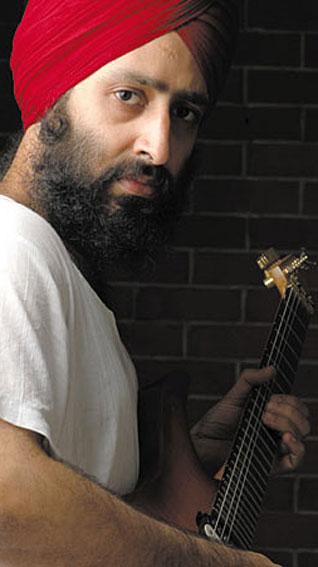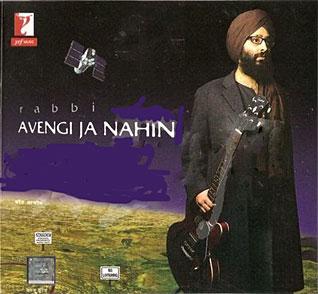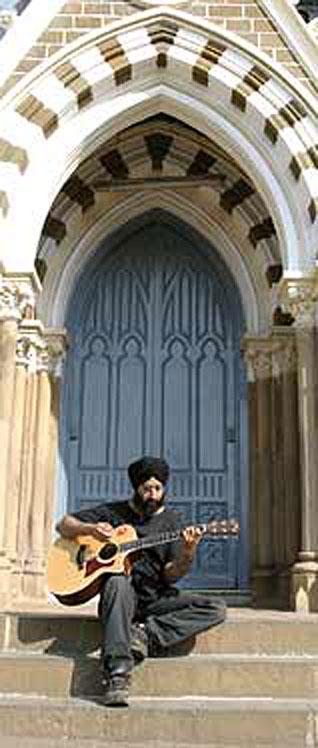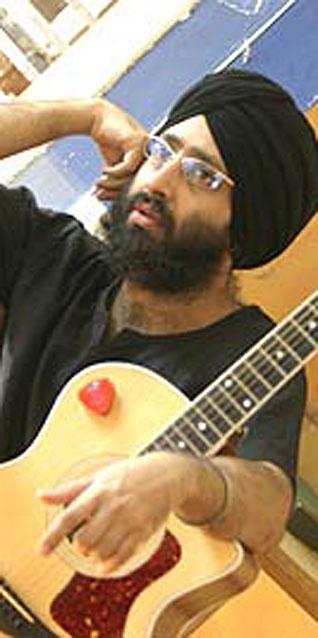Music
Rabbi Shergill:
Back on Track
by PALLAVI JASSI & ANKIT AJMERA
He burst on the music scene with his hit single "Bulla ki Jaana" - and the album shortly thereafter, entitled Bulla - in 2005, and then turned into a Bollywood music director with Delhi Heights.
Rabbi Singh Shergill, known for his acoustic Punjabi melodies, is back with his second album, Avengi ja Nahin, which also sees him producing a couple of his tracks - another first for his career.
"This album has been triggered by random things that surround us in normal life. Broadly, the theme of the songs is restlessness", he says of the album that has songs like "Ballo" talking about the girl child, and the title track that expresses the dilemma of unrequited love. The album, which has been recorded and produced across Brazil, Italy, Delhi and Mumbai comes after a gap of three years.
"It's pure laziness that has taken me so long to come out with the album. And besides, I need to feel excited about whatever I'm doing", says Rabbi, who has also penned the lyrics in the album.
While Punjabi and Hindi are expected, Rabbi's multilingual talent extends to the only English track that he has done for this set.
"There's one English track called "Return to Unity" that came about while I was at a station in London. The song comes out of the cultural angst I felt then", he explains.
While he has been recognized as a Sufi singer, Rabbi asserts that everything spiritual is not Sufi. And it is his default music - the western hard rock tune - that drives his compositions more than Sufi itself.
"There might be resonance of spirituality, but my primary influences range from Bruce Springsteen to Bob Dylan", admits Rabbi, whose songs, apart from his signature guitar, have strains of the Italian cello along with the Greek bouzouki.
But apart from singing and writing, this independent artist has even produced a couple of his songs as well. "Yes, there are two songs that I have produced, since they are acoustic numbers. It's me playing the guitar and singing so I decided to arrange them as well", he says, who has three other producers - Italian Maurio Pagani, K.J. Singh and Gaurav D - featured on this album.
While he is the first independent artist that the Yash Raj music has signed, Rabbi hopes that he gets to produce an album for a band soon. "I like the production aspect of music, as well. But I would like to produce for another artist or a band", he smiles.
Back in 2005, Rabbi gave a performance at a live concert, where he also launched his then new album, Bulla. The audience burst into a thunderous applause the moment they heard the opening lines of what had already become a worldwide hit: "Bulla Ki Jaana".
The album now being released, titled Avengi Ja Nahin, is the singer's second.
Avengi Ja Nahin contains nine songs and deals with issues like communal violence and social responsibility.
The title literally translates into "Will you come or not?"
When asked why Rabbi took almost three years to launch his second album, he says, "I am a very lazy man. I was just chilling out in the hills all these years".
Avengi Ja Nahin was launched in association with eZone and Depot.
Rabbi is an alumnus of Khalsa College, Delhi. After leaving college, he sang ad jingles for brands such as Yamaha RX-T motorbikes and Nova ghee. He struggled for many years to get his debut album published.
Has struggle taught him anything?
"It has taught me to be patient. I have expanded myself to the limits but there is something new to learn every day", he says.
Does he think that he has become a better human being after all these years? "That is for others to decide. Not me", he remarks.
Rabbi comes from a family which has no musical influence. His father was a Sikh Elder and his mother a renowned academic and college principal. Then how did music happen to him?
"In 1989, Bruce Springsteen came to India for a concert. I was so impressed by him that I decided to become a singer. From then on, it's been my dream to rock people with my music", he says.
Rabbi has worked as a music director and lyricist for the Hindi movie, Delhi Heights. Is he working on any other film?
"Right now, I am not doing any films. But I will be working on my next album", he says. What is the next album about? "I have a bank of fifteen songs. So I hope to put them together".
What is the one wish that Rabbi wants to realize as long as he is alive? "My only wish is to see the Nehru stadium in New Delhi full of people while I perform", he says.
More on Avengi Ja Nahin:
YRF Music has released Rabbi's second album, Avengi Ja Nahin, produced by the Italian progressive rock maestro and producer Maurio Pagani. Pagani has arranged and conducted the strings, and Rabbi has produced or co-produced a couple of the songs.
As with the first album, the music and lyrics have been written completely by Rabbi, though the language used ranges from Punjabi to Hindi and even English. This time, he engages more directly with social issues, even as he grapples with the downside of romantic love. However, the directness and intensity never lapses into pedantic and the music is a winner through and through.
The album opens with "Chhalla", a deceptively simple and contemplative song built on a layer of double bass and cello topped up by Rabbi's acoustic guitar and the occasional accordion. The song flows along smoothly creating visual images reminiscent of a boatman's song as he rhythmically rows his boat down the river.
Rabbi moves to electric rhythm and lead guitars on the next track, "Karachi Valiye". It's a tribute to the Karachi girl whose "sighs were so cold" and "hair was so coarse". Rabbi belts out this number with passion, even as emphatic rock drumming and the Hammond organ keep the pace driving and intense.
The pace cools down somewhat for the next track, "Maen Bolia", but not the passion. Rabbi speaks of love unrequited - and promises that his love will make the unresponsive beloved suffer, even if she does not know it yet.
When Rabbi sings "Sirf tainu ajje pata nahi" ("Only, you don't know it yet"), he manages to infuse it with tenderness and just a little hint of exasperation, even as his lead guitar solo soars, with the confidence that the girl will ultimately be his.
The title track "Avengi Ja Nahin" makes effective use of percussions and the traditional Greek musical instrument, the bouzouki. If "Maen Bolia" is about love not returned, "Avengi Ja Nahin" is about love uncertain and pregnant with possibilities that are not acted upon.
"Ballo" is an impeccably constructed song that benefits immensely from the minimal sprinkling of turntable and electronic sounds and the sustained use of handclaps and finger snaps. Rabbi sings it beautifully, too, his soulful voice effortlessly navigating the peaks and troughs of the emotions his lyrics weave.
The next track, "Tu Avin Bandra", is a love song as well, but it is an ode not to any woman but to the Mumbai suburb of Bandra! The one song typifies the label "urban contemporary" and has a haunting romantic feel to it.
"Pagri Sambhal Jatta" is an exhortation by Rabbi to the present to remember the lessons of the past. However, it also asks why these sacrifices and following the instructions of the Guru have still led to a state of disunity. A contemplative song in parts, a rousing one in others, it occasionally carries a whiff of legendary historically-anchored songs like Billy Joel's "We Didn't Start the Fire".
"Bilqis (Jinhe Naaz Hai)" is the most direct of all the songs in the album. Sung in Hindi, it forcefully gives voice to Bilqis Rasool, victim of horrific majoritarian violence during the Gujarat riots; the idealistic Satyendra Dubey and Manjunath Shanmugham who paid with their lives for standing up to corruption; and social activist Navleen Kumar who was killed for fighting for the rights of the dispossessed.
The album ends with the English song, "Return to Unity", that proves Rabbi's multilingual talent. It has Ranjit Barot on drums and Karl Peters on guitars and would not be out of place on the albums of any contemporary rock band from the West. At the end of a journey that sometimes touches on desperation and anguish, Rabbi reminds us that he is at heart an optimist.
To sum it up, Avengi Ja Nahin showcases an artiste at the peak of his powers, but in a state of constant maturing and evolution. For those who loved his first album, Rabbi's second will be an unalloyed delight.
[Courtesy: Express India, Daily News & Analysis and Business of Cinema.]
June 24, 2008
Conversation about this article
1: Bhupinder Singh Ghai (New Delhi, India), June 25, 2008, 5:02 AM.
Thank God he makes sensible music, unlike hordes of guys from Punjab who are selling their farmlands and making tacky Z-grade music videos by the dozen.
2: Brijinder Khurana (Delhi, India), June 27, 2008, 3:06 AM.
Good Luck, Rabbi Shergill. Your musical compositions are so soft that they help many people recover from prolonged illnesses by stimulating their minds.
3: Jasbir (India), June 28, 2008, 4:00 PM.
Rabbi is at his finest in this latest album. There are the most delicate layers of music in each of its songs. It's difficult to say what he's best in: as a great singer, or a great guitarist, or a great lyricist. Oh god, Rabbi is great!
4: Moin (U.S.A.), July 01, 2008, 10:46 AM.
Rabbi's first album was awesome. Looking forward to his latest album.
5: Pulin Pathneja (India), July 09, 2008, 3:49 AM.
Rabbi, whenever you will perform at Nehru Stadium, I will be there definitely :)
6: Sharanjit Singh (Mohali, India), July 18, 2008, 6:56 AM.
It is so heartening to see a real Punjabi or, one should say, son of the soil, rising to such high levels of the musical world. Not only are the artistic talents of Rabbi immense, but he also does not forget righteousness as a pre-requisite for good civilisation and expresses indignation against contemporary sins in his beatiful songs. We wish him every success.
7: Deepkanwal (Ontario, Canada), August 16, 2008, 12:09 PM.
I really enjoyed his debut album, and though I was a bit disappointed by his latest release, it still has some great songs. Looking forward to more stuff by this great musician.
8: Sukhbir Singh (Melbourne, Australia), October 06, 2008, 3:54 PM.
East or West, Rabbi is best.
9: Mukul Singh (Jaipur, India), December 29, 2008, 4:23 AM.
Realy, Rabbi, you have a magical voice ... Chakk de..!






